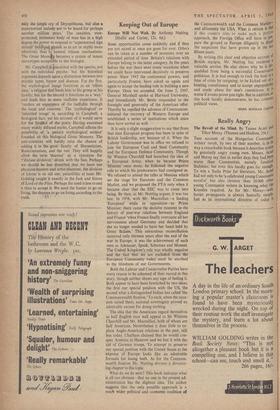Keeping Out of Europe
Europe Will Not Wait. By Anthony Nutting. (Hollis and Carter, 12s. 6d.)
SOME opportunities come suddenly and if they are not seized at once are gone for ever. Others can be taken at a number of moments over an extended period of time. Britain's relations with Europe belong to the latter category. In the years before the war there were many occasions when we could have intervened decisively to preserve peace. Since 1945 the continental powers, and particularly France, have asked us again and again to accept the leading role in building a new Europe. Once we accepted. On June 5, 1947, General Marshall spoke at Harvard University, and immediately Mr. Bevin responded to the foresight and generosity of the American offer. Thereby he repelled the advance of Communism, initiated the recovery of Western Europe and established a series of institutions which since then have served us well.
It is only a slight exaggeration to say that from that date European progress has been in spite of British leadership, not because of it. When the Labour Government was in office we refused to join the European Coal and Steel Community and the European Defence Community. Though Sir WinSton Churchill had launched the idea of a European Army, when he became Prime Minister' once more, he followed the negative role to which his predecessors had consigned us. We refused to attend the talks at Messina which set the stage for Euratom and the Common Market, and we proposed the FTA only when it became clear that the EEC was to come into being. By then, as Mr. Nutting argues, it was too late. In 1958, with Mr. Macmillan—a leading 'European' while in opposition—as Prime Minister, there came the decisive moment in the history of post-war relations between England and France 'when France finally overcame all her nervousness about Germany and decided that she no longer needed to have her hand held by Great Britain.' This miraculous reconciliation occurred only thirteen years after the end of the war in Europe; it was the achievement of such men as Adenauer, Spaak, Schuman and Monnet. The United Kingdom's role was wholly negative and the fact that we are excluded from the European Community today must be ascribed to the blindness of our Governments.
Both the Labour and Conservative Parties have every reason to be ashamed of their record in this story, though neither shows any sign of feeling it. Both appear to have been bewitched by two ideas, the first our special position with the US, the second what a distinguished Indian has called 'the Commonwealth fixation.' To each, when the occa- sion suited them, national sovereignty proved an admirable excuse for doing nothing.
The idea that the Americans regard themselves as half English may well appeal to Sir Winston Churchill and Mr. Macmillan, both of whom are half American. Nevertheless it does little to ex- plain Anglo-American relations in the past, still less today. Chatham claimed that he would con- quer America in Hanover and we lost it with the aid of German troops. To attempt to preserve our special position with the United States at the expense of Europe looks like an admirable formula for losing both. As for the Common- wealth fixation Mr. Nutting devotes a devastat- ing chapter to this topic.
What do we do next? This book indicates what is all too obvious—that no one in the present ad- ministration has the slightest idea. The author suggests that the only possible approach is a much wider political and economic coalition of etf
that itive
Pre; spa
last the Commonwealth and the Common Mark and ultimately the USA. What is certain is if this country tries to make such a pos approach, the Foreign Office will have to pare the ground in Europe diligently to di the suspicions that have grown up in the fifteen years.
By writing this clear and objective account of British myopia, Mr. Nutting has rendered a valuable service. He also shows why he is dis• qualified from being a successful Conservative politician. It is bad enough to rock the boat at a time of crisis by resigning; to be kicked out of a hunting constituency and to accept unpopularity and crude abuse for one's convictions. It is worse if events prove you right. But in addition, as this book lucidly demonstrates, he has coherent political views.
MARK BONHAM CARTER


































 Previous page
Previous page